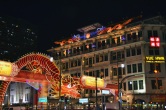By Keith B. Richburg, The Washington Post, March 16, 2012 —
BEIJING — The dramatic events this week in China underscored one of this country’s most baffling dichotomies: between an increasingly sophisticated and globally connected economy, now the world’s second-largest, and the opaque, Leninist-style Communist Party that still runs it, with almost no transparency or public accountability and seemingly resistant to calls for political reform.
China is set for a leadership transition this fall, with the top job — Party general secretary and national president — expected to go to the current vice president, Xi Jinping. There will also be seven new faces on the all-powerful nine-member Politburo Standing Committee, the body that effectively runs the country.
Only a tiny handful of China’s 1.3 billion people have any say in who these new leaders will be, however, and few have any clue what they believe or where they plan to take the country.
Ostensibly, the new leadership team will be elected by 2,000-plus delegates to the National Congress, which meets every five years, including this year. In reality, all decisions are made beforehand by a small clique believed to include the current Politburo Standing Committee members and some retired Party grandees, such as former president Jiang Zemin and former premier Li Peng, who represent sometimes competing factions.
Even Prime Minister Wen Jiabao seemed to acknowledge the paradox that is modern China on Wednesday, when he said at what is likely to be his last major news conference, “We must press ahead with both economic structural reform and political structural reform — in particular, reform in the leadership system of our party and country.”
But Wen has often called for political reform in the past — typically using the same words — to no apparent effect. And within hours of his latest remarks, the Communist hierarchy demonstrated once again just how secretively it operates. . . .
China’s modern economy belies secretive and opaque politics – The Washington Post
_______________
See also Mitt Romney profiting from sales of security cameras to Chinese government
See also EDITORIAL: Remembering the Tibetans’ plight
See also, The U.S. Congressional-Executive Commission on China – 2011 Annual Report:
Click here to download a copy of the Commission’s full 2011 Annual Report.
The Congressional-Executive Commission on China, established by the U.S.-China Relations Act of 2000 as China prepared to enter the World Trade Organization, is mandated by law to monitor human rights and the development of the rule of law in China. The Commission by mandate also maintains a database of information on political prisoners in China—individuals who have been imprisoned by the Chinese government for exercising their civil and political rights under China’s Constitution and laws or under China’s international human rights obligations. All of the Commission’s reporting and its Political Prisoner Database are available to the public online via the Commission’s Web site, http://www.cecc.gov.
See also The Republican Conundrum









Leave a comment